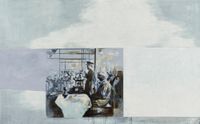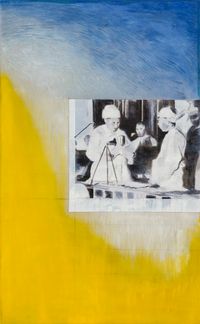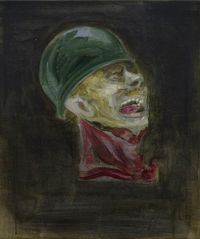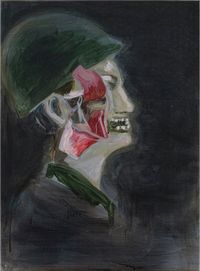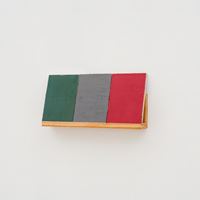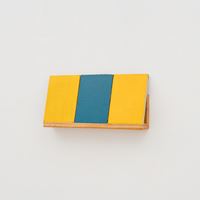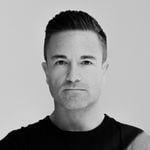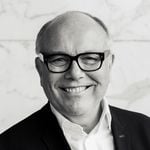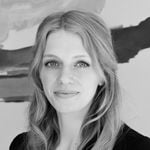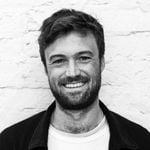Working across painting and installation, Sawangwongse Yawnghwe's practice examines the sociopolitical climate of Myanmar, including patterns of political violation, human rights oppressions and conflicts between military and ethnic groups.
Read MoreUsing his family's past as a point of reference, Yawnghwe explores the personal and political in the midst of prolonged turmoil.
Sawangwongse Yawnghwe was born in 1971 into a royal family in Shan State of Myanmar. After the country gained independence from Britain in 1948, Yawnghwe's grandfather, Sao Shwe Thaik, became the first president of the Union of Burma. When Shwe Thaik died in prison in 1962 following a military coup, Yawnghwe's family was exiled, first fleeing to Thailand in 1972 and later to Canada in 1985. There, Yawnghwe studied at Emily Carr University of Art + Design and Concordia University, then moved to Italy, where he co-founded the Museum of Modern Art Panzano in Tuscany in 2007.
Family photographs and archival images have long been a mainstay in Yawnghwe's practice. Many early works were portraits of his family members, painted on linen using muted colours. In the 2004 painting My Grandfather, Yawnghwe depicts his grandfather without any facial features or expression. In other paintings such as My Father on Independence Day (2004) or My Father on a Horse (2005), Yawnghwe depicts his father in military uniform, referring to his family's political heritage. Other paintings of that era, such as Their New Freedom II (2005), depict rebels and citizens in army camps.
Over time, Yawnghwe began combining figuration and geometric abstraction in his paintings, using historic socio-political images juxtaposed with flattened planes in a range of colours and graphic patterns. In My Father (Black) (2019), a portrait of the artist's father takes up less than a third of the linen canvas, while the rest of the picture plane is covered in textured black paint. Similarly, in the 2019 painting My Grandmother/Shan State War Council, the canvas is divided into six rectangular parts; one depicting an image of the artist's grandmother, while the other five contain monochromatic blocks in colours referencing the old flag of Myanmar.
Politics have remained at the forefront of Yawnghwe's paintings; in the large-scale acrylic painting The 2nd of March 1962, Rangoon, Burma (2016), a group of military men threatening a family with guns portrays a Goya-like scene of violence. In Midnight 1947 (2019), Yawnghwe depicts a crowd in the distance, referring to the dawn of the general election for Burma's independence.
Discussing his process in a 2022 interview with Ocula Magazine, the artist explained: 'I usually start with a grid to transfer the image. It provides a good structure and I go in with the brush right away. There's no drawing. When the photographic image is almost finished, I start thinking about the left side. The abstract pattern.'
Yawnghwe's practice also extends to installation; in the 2014 work Yawnghwe Office in Exile, Yawnghwe created a fictional office to explore possible narratives for Shan exiles. The installation contained drawings of minority groups of Burma, paintings and symbolic photographs of 1960s resistance and suppression, flow charts interpreting segments of the armed groups and the current involvement of industry, politics, economy and NGOs in today's efforts of peacekeeping in the country.
In 2021, Yawnghwe held a solo exhibition at Jane Lombard Gallery in New York. Titled Cappuccino in Exile, works in the show responded to the military coup that began in February 2021 when Myanmar's military government declared the outcome of the 2020 democratic election fraudulent. Through paintings and installation, Yawnghwe explored the events, his family's exile; and the conflict between drugs, revolutionary armies, minority ethnicities, mining and gas pipelines, genocide and the army state.
Yawnghwe's work has been included in international exhibitions including the Dhaka Art Summit, Bangladesh (2020); Asia Pacific Triennial of Contemporary Art, Australia (2018); Gwangju Biennale Exhibition, South Korea (2018); Dhaka Art Summit, Bangladesh (2018); Qalandiya International—Jerusalem Show VIII (2016); Steirischer Herbst, Austria (2016); and Dak'Art 2016/The 12th Biennale of Contemporary African Art, Senegal (2016).
Yawnghwe's work has exhibited in numerous museums, including the National Museum of Modern and Contemporary Art, Seoul (2020); Museum of Modern Art in Warsaw (2018); Van Abbemuseum, Netherlands, (2018); MAIIAM Contemporary Art Museum, Thailand (2018); Irish Museum of Modern Art (2016); and Stedelijk Museum Bureau Amsterdam (2015). His works are housed in the collections of MAIIAM Contemporary Art Museum in Thailand and Singapore Art Museum.
Yawnghwe lives and works between Thailand and the Netherlands.
Leila Sajadi | Ocula | 2022
